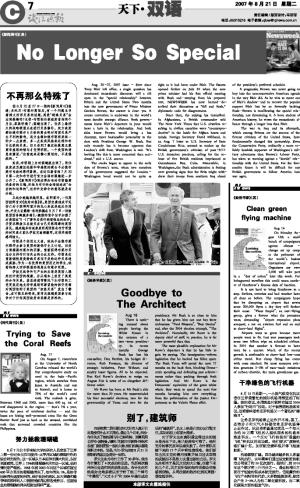Aug. 20-27, 2007 issue - Ever since Tony Blair left office, a single question has dominated transatlantic discourse: will a rift open in the "special relationship" between Britain and the United States Two months into the new government of Prime Minister Gordon Brown, the answer is clear: yes. A course correction is underway in the world's most durable strategic alliance. Both governments knew Blair's departure in June would leave a hole in the relationship. And both sides knew Brown would bring a less chummy, more businesslike personality to the duet with President George W. Bush. But only recently has it become apparent that London's drift from Washington is real. "It's looking like this is more concerted than accidental," said a U.S. source.
The cracks began to appear in the early days of Brown's term, when two members of his government suggested the London-Washington bond would not be quite as tight as it had been under Blair. The fissures opened further on July 30 when the new prime minister had his first official meeting with Bush and—straying from his prepared text, NEWSWEEK has now learned—described their discussions as "full and frank," diplomatic code for disagreement.
Since then, the sniping has intensified. In Afghanistan, a British commander told The New York Times that U.S. airstrikes resulting in civilian casualties were "counterproductive" in the battle for Afghan hearts and minds. Foreign Secretary David Miliband, in an Aug. 7 letter to U.S. Secretary of State Condoleezza Rice, seemed to ratchet up the British government's criticism of post-9/11 U.S. detention practices, calling for the release of five British residents imprisoned at Guantánamo Bay, Cuba. Meanwhile, in Washington,the Bush administration is fretting over growing signs that the Brits might withdraw their troops from southern Iraq ahead of the president's preferred schedule.
A pragmatist, Brown was never going to buy into the neoconservative American agenda in the way Blair did. As he tries to move out of Blair's shadow—and to recover the popular support Blair lost by so fervently backing Bush—Brown is recalibrating the special relationship, not threatening it. A keen student of American history, he views the transatlantic alliance through a longer lens than Blair.
The war in Iraq and its aftermath, which among Britons are the sources of the fiercest criticism of the United States, have fundamentally changed this partnership. Even the Conservative Party, ordinarily a more reliably hawkish supporter of Washington's military adventures than Brown's Labour Party, has taken to warning against a "slavish" relationship with the United States. For the foreseeable future it will be difficult for any British government to follow America into war again.

